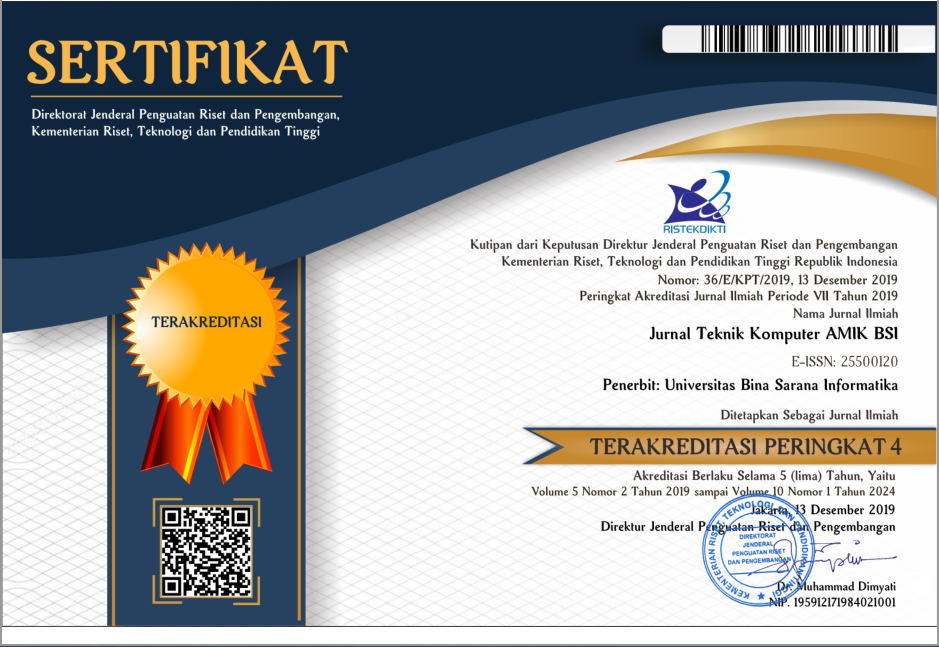Using Certainty Factor Method To Determine Work Commitment Generation Y
Abstract
At present, in the world of work there are three generations that color the workforce, namely baby boomers born in 1943-1960, generation X 1961-1979 and generation Y 1980-1994. Generation Y is an individual born in the development of information technology and a high level of education so that Generation Y is very achievement-oriented, hard-working and will strive to achieve success but Generation Y has a tendency to move around at work, lack of work commitment so that this causes companies to experience difficulties in determining the performance commitment of generation Y if this continues it will have an impact on the sustainability of a company, so we need a certainty factor method to determine the work commitment of generation Y. from research that has been done by taking one sample by applying the certainty factor method produced that one of the Y generation has a commitment to the feeling of love in an organization that raises the willingness to stay and foster social relationships and appreciate the value of relationships with the organization because it has become a member or ganisasi (Affective commitment)
Keywords
Full Text:
PDFReferences
Bolton, R. N., Parasuraman, A., Hoefnagels, A., Migchels, N., Kabadayi, S., Gruber, T., … Solnet, D. (2013). Understanding Generation Y and their use of social media: A review and research agenda. Journal of Service Management. https://doi.org/10.1108/09564231311326987
Jorgensen, B. (2003). Baby Boomers, Generation X and Generation Y? Foresight. https://doi.org/10.1108/14636680310494753
Krahn, H. J., & Galambos, N. L. (2014). Work values and beliefs of “Generation X” and “Generation Y.” Journal of Youth Studies. https://doi.org/10.1080/13676261.2013.815701
Krause, P., Clark, D., Krause, P., & Clark, D. (1993). The Certainty Factor Model. In Representing Uncertain Knowledge. https://doi.org/10.1007/978-94-011-2084-5_3
Lancaster, L. C., & Stillman, D. (2003). From World War II to the world wide web: Traditionalists, Baby Boomers, Generation Xers, and Millennials at work. Women in Business.
Meyer, J. P., & Maltin, E. R. (2010). Employee commitment and well-being: A critical review, theoretical framework and research agenda. Journal of Vocational Behavior. https://doi.org/10.1016/j.jvb.2010.04.007
Morton, L. P. (2002). Targeting Generation Y. Public Relations Quarterly.
Queiri, A., Wan Yusoff, W. F., & Dwaikat, N. (2015). Explaining generation-Y employees’ turnover in Malaysian context. Asian Social Science. https://doi.org/10.5539/ass.v11n10p126
Reisenwitz, T. (2009). Differences in Generation X and Generation Y: Implications for the Organization and Marketers. Marketing Management Journal.
Salahudin, S. N. bin, Alwi, M. N. R. bin, Baharuddin, S. S. bt, & Abd Samad, N. I. bt. (2016). Generation Y: Organizational Commitment and Turnover Intention. https://doi.org/10.15405/epsbs.2016.11.02.41
Smola, K. W., & Sutton, C. D. (2002). Generational differences: Revisiting generational work values for the new millennium. Journal of Organizational Behavior. https://doi.org/10.1002/job.147
Swartout, W. R. (1985). Rule-based expert systems: The mycin experiments of the stanford heuristic programming project. B.G.
Buchanan and E.H. Shortliffe, (Addison-Wesley, Reading, MA, 1984); 702 pages, $40.50. Artificial Intelligence. https://doi.org/10.1016/0004-3702(85)90067-0
Tan, K. L., Lew, T. Y., & Sim, A. K. S. (2019). An innovative solution to leverage meaningful work to attract, retain and manage Generation Y employees in Singapore’s hotel industry. Worldwide Hospitality and Tourism Themes. https://doi.org/10.1108/WHATT-11-2018-0075
VanMeter, R. A., Grisaffe, D. B., Chonko, L. B., & Roberts, J. A. (2013). Generation Y’s Ethical Ideology and Its Potential Workplace Implications. Journal of Business Ethics. https://doi.org/10.1007/s10551-012-1505-1
Wan Fadzilah Wan Yusoff, Abdelbaset Queiri, Sabarudin Zakaria, Raja Rizal Iskandar Raja Hisham. (2013). Generation-Y Turnover Intention. 2nd International Conference on Management, Economics And Finance (2nd ICMEF 2013).
Zemke, R., Raines, C., & Filipczak, B. (1999). Generation Gaps in the Classroom. Training.
DOI: https://doi.org/10.31294/jtk.v7i1.10240
Copyright (c) 2021 Syahrul Fahri, Hasanul Fahmi, Jijon Raphita Sagala, Yuda Perwira, Yessy F A Lubis, Nurjamiyah Nurjamiyah, Mufida Khairani

This work is licensed under a Creative Commons Attribution-ShareAlike 4.0 International License.
ISSN: 2442-2436 (print), and 2550-0120











